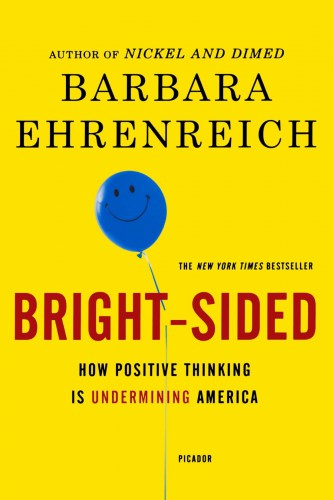
For years, I lived with the nagging thought that my melancholy, pessimism, and cynicism were taking years off my life. I did not arrive at that conclusion based on research or conviction; I absorbed it from the assumption, endemic in American culture, that subjective positivity improves objective markers of healthfulness. Once my therapy regimen broke through the fog of clinical depression, I saw the difference between truly unhealthy behaviors and an intractable melancholy disposition. Even though I feel mentally healthier, will my lack of optimism or positive thinking kill me?
A recent study published in The Lancet suggests that I’ll be just fine:
Poor health can cause unhappiness and poor health increases mortality, so unhappiness is associated with increased mortality. Additionally, unhappiness might correlate with some adverse lifestyle choices. After allowance for these associations our large prospective study shows no robust evidence that happiness itself reduces cardiac, cancer, or overall mortality….
Self-rated health was the most important confounding factor in our analyses; where other investigators adjusted for self-rated health, any apparent excess mortality associated with unhappiness was attenuated or disappeared completely. If there is inadequate allowance for ill health at baseline, any associations between happiness and lower mortality are likely to be artefactual…. We conclude that happiness and unhappiness have no material direct effect upon mortality.
The conclusion about poor health leading to unhappiness is a nice affirmation of common sense. Unhealthy people are unhappy about their state of life, and they die sooner than healthy people (but from poor health, not unhappiness). Importantly, the results reported by the study authors suggest that illness—not attitude—leads to a shorter life. The researchers used a statistical analysis to edit out, so to speak, the confounding effects of age and poor health (Cox regression, for those who are curious). These adjusted results found no significant relationship between happiness/unhappiness and mortality, leading the authors to the conclusion bolded above.
The study has important limitations. The population was women living in the United Kingdom, so it doesn’t definitively establish a null relationship between happiness and mortality at the population level in all places. The study also was based on a one-question assessment of self-rated happiness and self-rated healthiness with no specific guidance. “Happy” could mean contentment with a family and career that together result in high stress, an optimistic outlook regardless of events or mood, or that particular day’s series of events. Still, it’s a really large study with very good mortality data (socialized medicine, regardless of its flaws, is wonderful for long-term follow-up).
Overall, the study data support the conclusion that much of the thinking behind one’s answer to “How happy are you?” is related to healthfulness—and the latter may itself be immutable. What, then, is the point of expending the effort to improve one’s happiness?
Most of us have some experience, similar to mine summarized above, with the effort required to increase positivity in one’s disposition, outlook, or both. Pro-happiness interventions like self-help books, “positive and encouraging” Christian radio stations, upbeat sermons, motivational seminars, and “offsite” workshops all can require significant effort. Most people acknowledge that clinical depression and anxiety should be treated with medical interventions, which have known risks. Increasing positivity, apart from mental illness, though, also has side effects. The (often severe) effort required to inject positivity into one’s outlook or disposition can become a source of stress and even shame. Happiness becomes a law rather quickly, so it’s worthwhile to ask whether increasing happiness/positivity is, well, worthwhile.
 The aforementioned study is part of a wider and contentious debate in the psychological and medical communities about whether happiness has measurable health-related benefits. The fact that researchers are asking the question reveals both the pervasiveness of happiness as law and the anxiety about behavioral factors in health. The study was conducted because there is clinical equipoise about happiness and mortality, meaning that there is presently a reasonable, substantive debate among researchers on this subject. Moreover, the implications of the study go beyond the relationship observed within the study population. The research question is important because we are frequently told that we can lengthen our lives via positivity-based interventions (see Barbara Ehrenreich’s takedown of the happiness mandate, particularly the chillingly judgmental and infantalizing culture of breast cancer survivors). It’s a horrible extension of FOMO (fear of missing out), e.g., “I don’t want to look back and regret that I missed out on years of life because I didn’t work to make myself happier.”
The aforementioned study is part of a wider and contentious debate in the psychological and medical communities about whether happiness has measurable health-related benefits. The fact that researchers are asking the question reveals both the pervasiveness of happiness as law and the anxiety about behavioral factors in health. The study was conducted because there is clinical equipoise about happiness and mortality, meaning that there is presently a reasonable, substantive debate among researchers on this subject. Moreover, the implications of the study go beyond the relationship observed within the study population. The research question is important because we are frequently told that we can lengthen our lives via positivity-based interventions (see Barbara Ehrenreich’s takedown of the happiness mandate, particularly the chillingly judgmental and infantalizing culture of breast cancer survivors). It’s a horrible extension of FOMO (fear of missing out), e.g., “I don’t want to look back and regret that I missed out on years of life because I didn’t work to make myself happier.”
Seen in this light, pro-happiness research and interventions are weapons of law that we use on ourselves. I’m not just missing out; I’m also behaving irresponsibly when I sit around and watch ~15 episodes of The Flash over Christmas break (to pick a totally, you know, random example) instead of finding ways to improve my attitude toward life. The self-judgment that unhappiness, depression, and anxiety can bring is especially pernicious in the family-values crowd. I have often reproached myself for the unhappiness (whether due to clinical depression or a melancholic disposition) that I assumed would bring me fewer years with my wife and children. The consequences cascade thereafter: fewer family vacations, more expensive stays in nursing and hospice homes, fewer moments with grandchildren, fewer anniversaries with my wife. And all because I couldn’t get over myself and be happy already? All because I wouldn’t do the hard work required to give more of my time to those I love?
Confirmation bias aside, the recent study allows frequently/chronically unhappy people to ask whether there is a positive benefit:risk ratio for doing the work to improve their happiness. There are costs to focusing on happiness as a self-improvement goal: time, money, attention. It is possible to earnestly work on happiness and deprive loved ones of that time, strain finances, or suffer an unexpected death that wholly negates the (probably illusionary) mortality benefit. It is also possible to try so hard and not succeed, as I have done, and experience resentment, anxiety, and shame. I therefore take comfort knowing that, as the muse of kvetching David Rakoff once wrote,
If one is characterologically incapable of not being a total [jerk], science has not shown you will die any sooner. People might just be gladder when you eventually do.

COMMENTS
6 responses to “Studies Show…That Happiness Is a Waste of Time”
Leave a Reply















Well, now I’m 28 percent more sure I’ll eventually grow to become a grumpy old man.
Thanks for this. I need to be reminded that happiness needn’t be a goal of mine. Not being happy leads to the despair of being depressed that I’m not happy. Then the guilt of being sad that I’m depressed. A vicious cycle.
Like Neo at the end of The Matrx, I will now embrace my role with confidence. Also with socks under my sandals and the hose of grace (to chase kids off my front yard).
You’re welcome and thanks, CSC! Great screen name, by the way. I totally relate to the vicious cycle you point out.
The first chapter in The Lost Virtue of Happiness by J.P. Moreland has changed my outlook on happiness. I think it can be a good and healthy goal if it is understood properly.
Hi Nathaniel,
Thanks for adding your thoughts. I am not familiar with the book you mention, but I agree that properly pursued, we can definitely make personal happiness a goal. I think that a few things are essential to making it healthy–no shame about depressive moods, no spiritual laws enforcing it (“dissatisfaction is a form of idolatry”), and no expectations that happiness by itself will guarantee a longer life or positive life circumstances. In other words, we can encourage people to seek happiness in a context of grace (as a gift rather than as a law) and original sin (bad things can and do happen to anyone). I wonder, though, whether what I’ve just stated could become an unhelpful law itself…
What would be the right way to seek happiness, in your experience and reading? I’d love to hear more from you!
Best regards,
Tim
I can get on board denying any correlation between happiness and a longer life or positive life circumstances. I do not claim to be an expert on this topic, but what I have come to believe over the past year or so is that our culture has reduced happiness to merely pleasure, which is a shift from how happiness has been viewed historically. J.P. Moreland asserts that the classic view of happiness, held by religious and irreligious historical figures, would be found in a life of character and virtue. Setting this view of happiness as a lifelong goal is what I meant in my post as a good and healthy goal.
Thanks very much, Nathaniel. I can attest to what you, via Moreland, are saying about happiness. My daily, subjective, superficial happiness often suffers because of my many responsibilities (chief among them working and raising children). I would, nevertheless, rate myself as happier now than when I was single and living in Hollywood with lots of disposable income.